As a holistic veterinarian and a dog parent myself, I understand that choosing the right breed can feel overwhelming, especially when you’re browsing through the long list of adorable dog breeds that start with P! Whether it’s the popular Pomeranian with its fluffy coat and cheerful disposition, the posh Poodle known for its intelligence and versatility, or the powerful Pitbull renowned for their loyalty and affection, these breeds all have unique traits that make them wonderful companions.
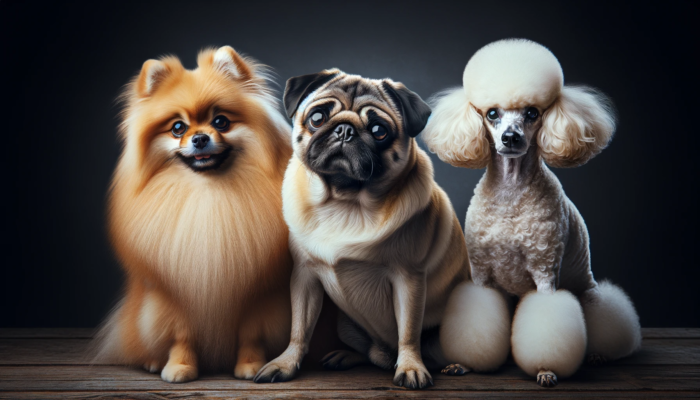
As we explore these breeds together, I want to draw your attention to the pint-sized pooches that start with P – such as the Pugs and Pekingese. These breeds may be small, but they’re filled with personality and charm, making them perfect for families or individuals looking for a compact companion. But remember, pint-sized doesn’t mean low maintenance. It’s essential to understand their specific needs and characteristics for a happy and healthy pup.
Let’s start our journey with the Pomeranian. These little dogs are known for their vibrant personality and fluffy double coats. They’re intelligent, lively, and incredibly loyal to their families. Taking care of a Pomeranian means regular grooming to keep their beautiful coats in top shape and providing them with mental stimulation to prevent boredom.
Next, let’s talk about the Poodle. Poodles come in three different sizes: Toy, Miniature, and Standard, each having its unique charm. They’re one of the smartest breeds, very trainable, and less likely to cause allergies, which is a plus for allergy sufferers. Raising a Poodle requires engaging their sharp minds with training and interactive games, and of course, maintaining their curly, hypoallergenic coats.
As we delve deeper into dog breeds that start with P, we’ll cover everything from Pitbulls to Papillons, Pugs to Pekingese, and even the Portuguese Water Dog. Each of these breeds has a unique set of characteristics, care requirements, and temperaments. As we navigate through this guide, you’ll gain a deeper understanding of these breeds, making it easier to find the perfect pooch that fits your lifestyle and personality. So, let’s dive in, shall we?
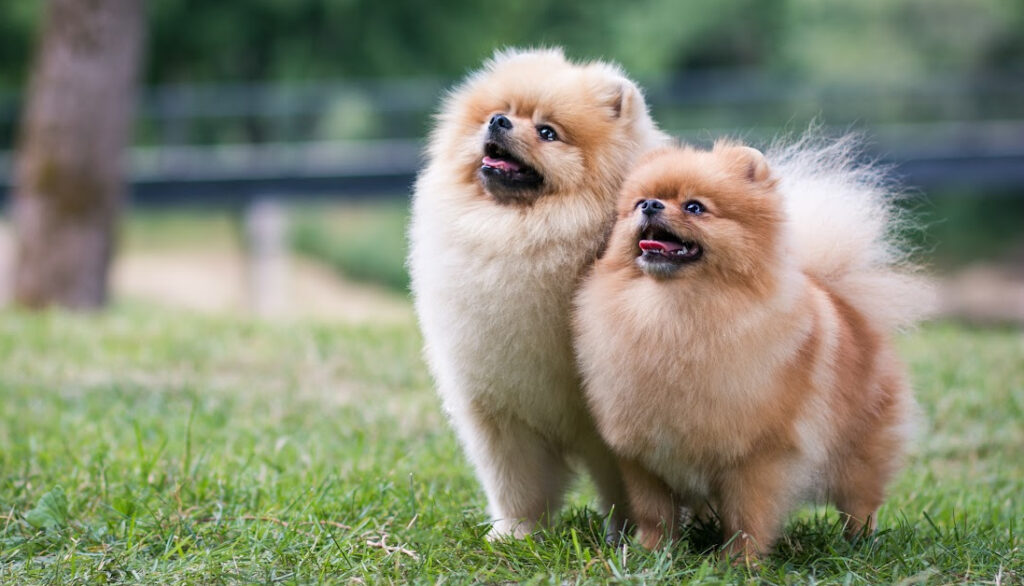
Pomeranian: A Popular Pooch
Have you ever been stupefied by a tiny, fluffy canine strutting down the street as if it owns the place? That would most likely be a Pomeranian, a dog breed that start with p and one of the most charismatic and popular small dog breeds in the world. These lively dogs are overflowing with personality and charm that belies their small size.
Characteristics of Pomeranians
Pomeranians are known for their outgoing and lively nature. They are a breed of the Spitz type, which explains their thick double coat, erect ears, and fox-like face. This breed is small, ranging from 3 to 7 pounds in weight but don’t let their size fool you. They are filled with energy and can keep you on your toes.
Their coat comes in a variety of colors, from solid black, white and cream, to multi-colored or patterned. They have a plume tail that arches over their back, adding to their distinctive silhouette.
The Pomeranian’s personality is a mix of curiosity, intelligence, and playfulness. They are alert and eager to learn new things, making them relatively easy to train. They’re also known for being a great watchdog, as they’ll bark at anything unusual or suspicious in their environment.
Caring for a Pomeranian
These little balls of fluff require regular grooming to maintain their luxurious coat. This includes daily brushing to prevent matting and knots, and regular bathing to keep their skin healthy.
When it comes to their diet, a high-quality dog food suitable for small breeds is usually the best option. Pomeranians are prone to dental problems, so consider incorporating dental chews or regularly brushing their teeth into their routine.
Exercise is also crucial for these energetic little dogs. Regular walks, playtime, and mental stimulation will keep your Pom happy and healthy. Despite their tiny size, they make good companions for moderately active people.
Training a Pomeranian requires patience and consistency. They are intelligent and quick learners but can be stubborn at times. Positive reinforcement methods work best with this breed, as they can be sensitive to harsh corrections.
Pomeranians are known for being quite vocal. While this makes them excellent watchdogs, it might not be ideal if you live in an apartment or a neighborhood with noise restrictions. Training can help manage their barking, but it’s a trait deeply ingrained in the breed’s nature.
Finally, Pomeranians are very social animals. They thrive on human companionship and can suffer from separation anxiety if left alone for long periods. If you’re a person who spends a lot of time out of the house, this might not be the breed for you.
As a holistic veterinarian, my advice is always to research and understand the breed you’re planning to bring into your home. A Pomeranian can be a delight to have around with its outgoing personality and playful demeanor. However, it’s essential to understand their care needs to ensure you provide the best possible home.
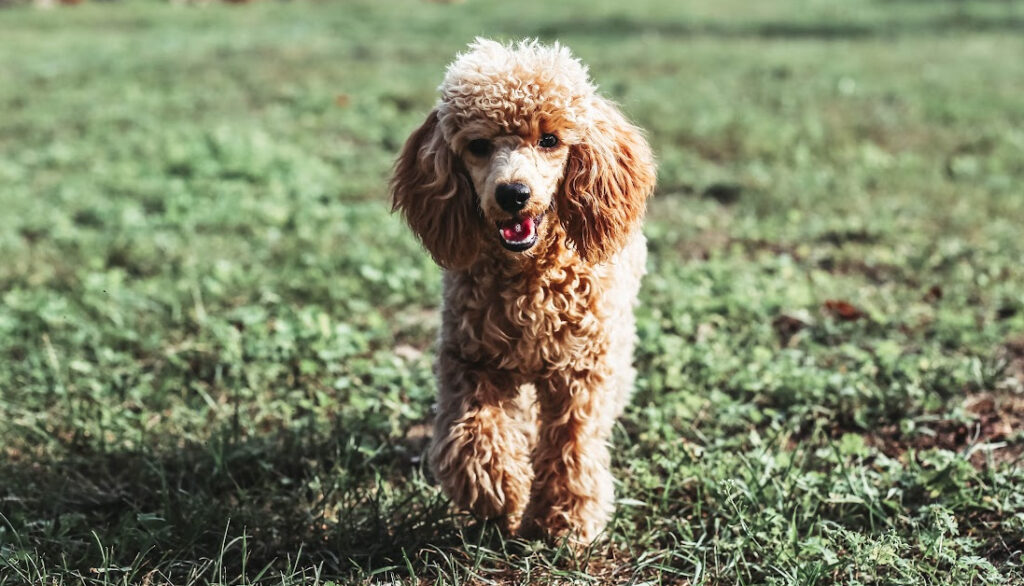
Poodle: A Posh and Precious Breed
The Poodle is one of the most recognizable dog breeds that start with P. Renowned for its elegant demeanor, high intelligence, and striking coat, the Poodle is more than just a pretty face. This breed comes in three sizes – Standard, Miniature, and Toy, each with its distinct charm and personality.
Understanding Poodle Types
Starting with the largest of the trio, the Standard Poodle, known for its strength, grace, and good nature. Standard Poodles are active and energetic, requiring regular exercise to keep them happy and healthy. They love to play fetch, swim, and even excel in many dog sports.
The Miniature Poodle shares many of the Standard’s traits but in a smaller package. They are intelligent, easy to train, and make excellent family pets. Miniature Poodles adapt well to various living conditions, making them ideal for urban dwellers.
Finally, the Toy Poodle, the smallest in the family, is charming, intelligent, and full of fun. Despite their diminutive size, Toy Poodles are confident and have a big-dog attitude. They are often the perfect companions for those living in apartments or with limited space.
Tips for Raising a Poodle
Poodles are smart and eager to please, which makes them highly trainable. They thrive on positive reinforcement and enjoy mental stimulation, so make sure training sessions are fun and varied.
- – Socialization is key. Poodles are naturally friendly but exposing them to different environments, people, and animals from a young age will ensure they grow into well-rounded dogs.
- – Poodles require regular grooming to maintain their beautiful, curly coats. This includes brushing at least once a week to prevent matting and regular trims to keep their hair at a manageable length.
- – Keep their minds active. Poodles are intelligent dogs that need mental stimulation to prevent boredom. Puzzle toys, advanced obedience training, and agility courses are all excellent ways to keep a Poodle’s mind sharp.
- – Regular exercise is critical. Poodles are active dogs and will need a good amount of daily exercise. This can include walks, playtime, or a swim in the pool.
Poodles are not just one of the dog breeds that start with P; they are a breed that brings a lot of love, joy, and companionship to their families. Whether you choose a Standard, Miniature, or Toy Poodle, you’re sure to have a loyal and loving four-legged friend. Remember to provide them with the care, training, and affection they deserve, and you’ll have a companion like no other.
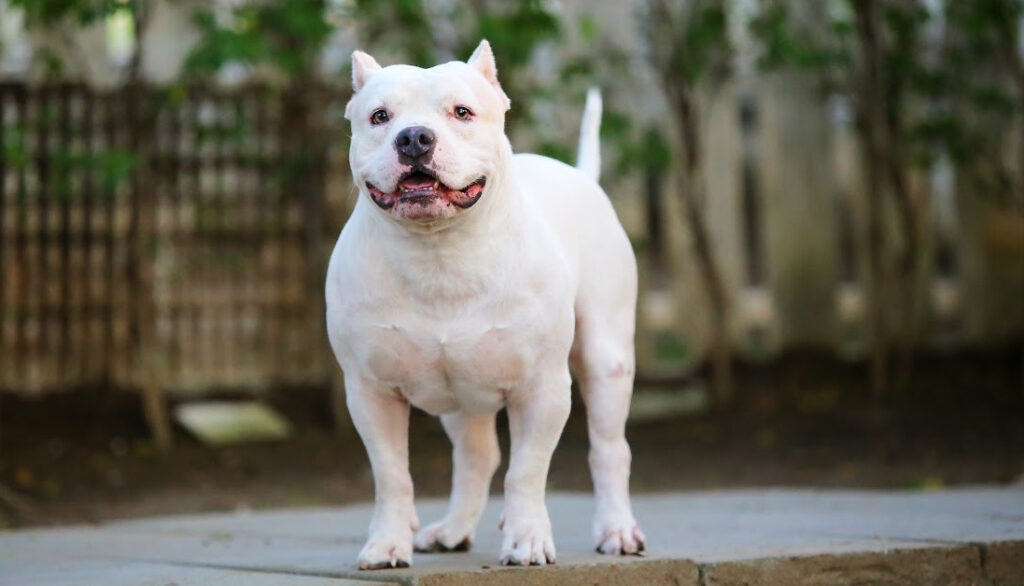
Pitbull: A Powerful and Playful Breed
When we dive into dog breeds that start with ‘P’, the Pitbull immediately stands out with its muscular physique and lively nature. Let’s debunk some misconceptions about this breed and dive into the art of raising a Pitbull.
Misconceptions About Pitbulls
Sadly, Pitbulls are often misunderstood and misrepresented, leading to a number of misconceptions about the breed. Contrary to popular belief, Pitbulls aren’t inherently aggressive or dangerous. Their reputation as a ‘vicious’ breed is largely unfounded and more a product of poor training and neglect than the dog’s natural temperament. In fact, the American Temperament Test Society consistently ranks Pitbulls as one of the most tolerant breeds.
Pitbulls are actually known to be extremely loyal, loving, and intelligent dogs when raised in a nurturing environment. They are great with children and, despite their powerful physique, they can be gentle and protective. Pitbulls are also quite playful, thriving on regular exercise and love to be part of family activities. They are highly trainable and eager to please, making them excellent companions.
Training and Caring for Pitbulls
When it comes to training and caring for Pitbulls, consistency and patience are key. Like all dogs, Pitbulls respond well to positive reinforcement techniques such as food rewards, praise, and play. In fact, harsh discipline can be counterproductive and could potentially lead to behavioral problems.
Here are a few pointers to raise a healthy and happy Pitbull:
- Socialization: Early socialization with other dogs and people is critical. It can help your Pitbull to grow up to be a well-rounded dog.
- Exercise: Pitbulls are active and energetic dogs. They need regular exercise to keep them physically and mentally stimulated.
- Diet: A balanced diet is essential for their health. Make sure to feed your Pitbull high-quality dog food that meets all their nutritional needs.
- Health check-ups: Regular visits to the vet for check-ups and vaccinations are a must to keep them in the best possible health.
While Pitbulls are generally healthy dogs, they can be prone to certain health issues, such as hip dysplasia and allergies. Hence, being vigilant about their health is crucial.
Remember, raising a Pitbull, like any other pet, requires dedication and commitment. But the effort is worthwhile when you get to share your life with these affectionate and loyal companions.
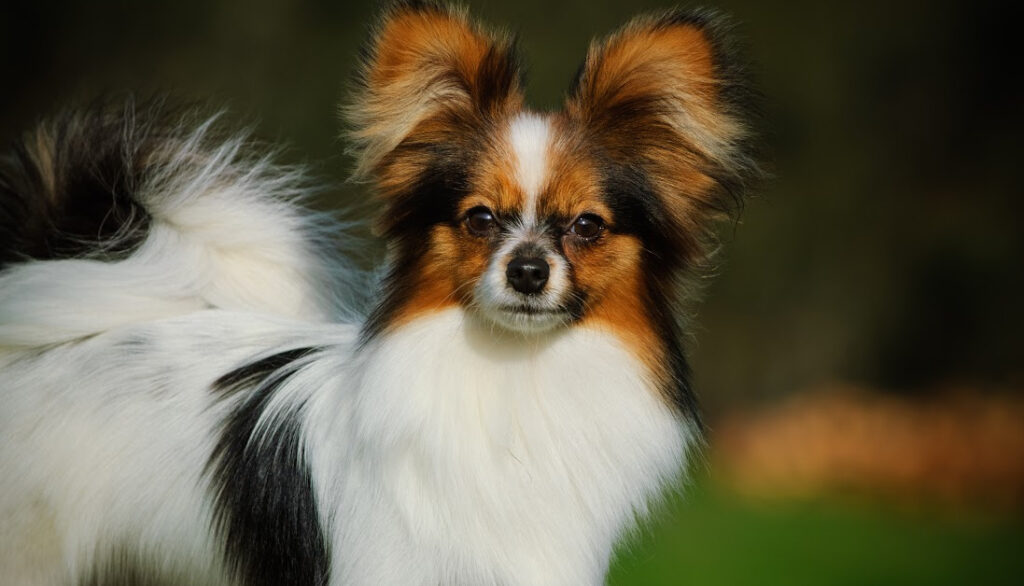
Papillon: A Petite and Playful Pooch
Characteristics of Papillons
If you’re a fan of small dogs with big personalities, the Papillon dog breed is one to consider. Named after the French word for ‘butterfly’, this breed is known for its unique, butterfly-like ears. But it’s not just their looks that make them stand out. Papillons are intelligent, energetic, and friendly dogs that can make a great addition to any family.
Papillons are small dogs, typically weighing between 5 to 10 pounds, and standing about 8 to 11 inches tall. They have a long, silky coat that’s usually white with patches of color, and a fluffy tail that arches over their back. But the most distinctive feature of a Papillon is its large, butterfly-like ears, which are covered in long, fringed hair.
Despite their small size, Papillons are known for their agility and athleticism. They are quick, nimble, and love to play. They also have a reputation for being intelligent and easy to train. In fact, they often excel in obedience and agility competitions.
Raising a Healthy Papillon
Raising a healthy Papillon requires a combination of good nutrition, regular exercise, and routine veterinary care.
Papillons are generally healthy dogs, but like all breeds, they can be prone to certain health conditions. Some common health issues in this breed include dental problems, heart conditions, and patellar luxation, a condition where the kneecap dislocates out of its normal position. Regular check-ups with a vet can help detect these conditions early and ensure your Papillon gets the care they need.
When it comes to feeding your Papillon, it’s important to provide a balanced diet that’s appropriate for their age, size, and activity level. Small breeds like the Papillon can be prone to obesity, so it’s important to monitor their weight and adjust their food intake as necessary.
Exercise is also crucial for a Papillon’s health and happiness. These dogs are active and love to play, so they need plenty of opportunities to burn off energy. This can include walks, playtime in the yard, or even agility training. Mental stimulation is also important for this intelligent breed, so puzzle toys and training games can be a great way to keep their minds sharp.
Raising a Papillon can be a rewarding experience. With their friendly nature, intelligence, and playful energy, they can bring a lot of joy to a home. Just remember that like all dogs, they require time, commitment, and love to thrive. If you’re willing to provide these, a Papillon can make a wonderful pet.
Remember: When it comes to dog breeds that start with P, the Papillon stands out as a petite, playful, and personable pooch that can bring a lot of love and joy to a home.
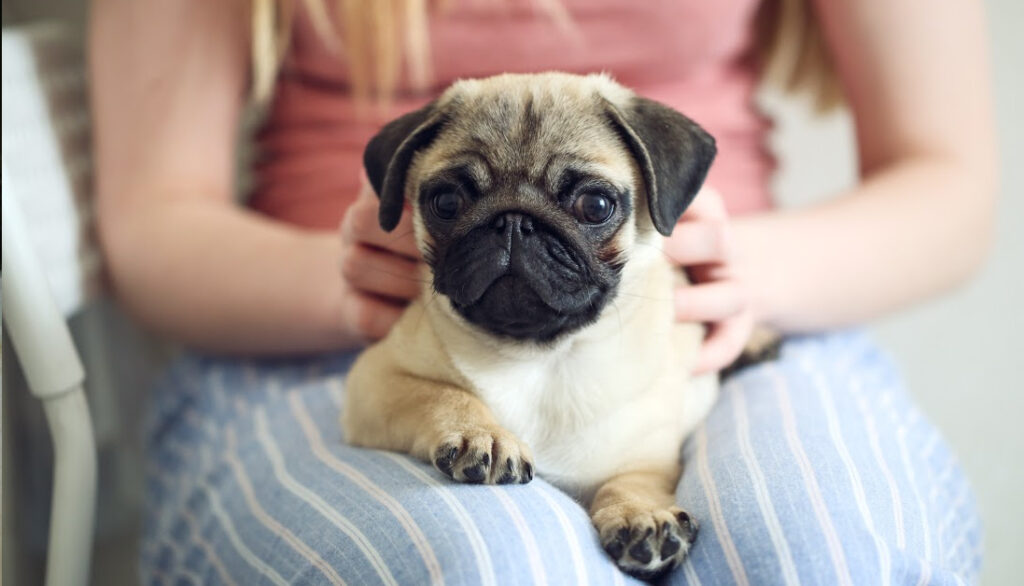
Pugs: A Popular and Pint-Sized Breed
Pugs, notorious for their irresistible cuteness and fun-loving nature, are a well-loved breed that begins with “P”.
Understanding the Pug Personality
These charming little creatures are full of personality. The pug is known for its endearing wrinkled face and expressive round eyes, making it impossible not to fall in love. Pugs are renowned for their sociable characters, adoring both humans and fellow pets alike. They crave companionship and are considered one of the friendliest dog breeds.
These vivacious little creatures are often full of energy and love to play. They are also known to be quite the clowns of the canine world, due to their hilarious antics and fun-loving nature. Despite their boisterous playfulness, pugs are remarkably adaptable. They’re equally content whether living in a spacious house with a yard or a small city apartment, as long as they have their beloved human by their side.
Yet, there’s more to pugs than just their fun-loving nature. They’re remarkably intelligent and often display an impressive level of intuition. They can sense their owner’s mood and will often respond with comforting cuddles when they sense you’re feeling down.
Health Considerations for Pugs
While owning a pug brings immeasurable joy, it’s important to be aware of the breed-specific health considerations. Due to their unique physical characteristics, pugs are prone to certain health issues.
One significant concern is their brachycephalic syndrome due to their short noses. This could lead to breathing difficulties, especially in hot weather or during exercise. Regular vet check-ups are essential to monitor their respiratory health.
Their distinctive skin folds, while adorable, can also trap dirt and moisture, leading to potential skin infections. Regular cleaning of these folds is necessary to prevent any issues.
Pugs are also susceptible to weight gain due to their love for food and their less active nature. A balanced diet and regular exercise are crucial in maintaining a healthy weight.
Eye problems are another common health issue in pugs. Their prominent eyes are more susceptible to injury and infection. Regular eye check-ups, proper grooming, and care can help prevent these issues.
Despite these health considerations, with the right care, love, and attention, your pug can lead a healthy, fulfilled life. Pugs are a testament to the adage that big things often come in small packages. They’re full of love, joy, and a whole lot of personality, making them one of the most beloved dog breeds that start with P.
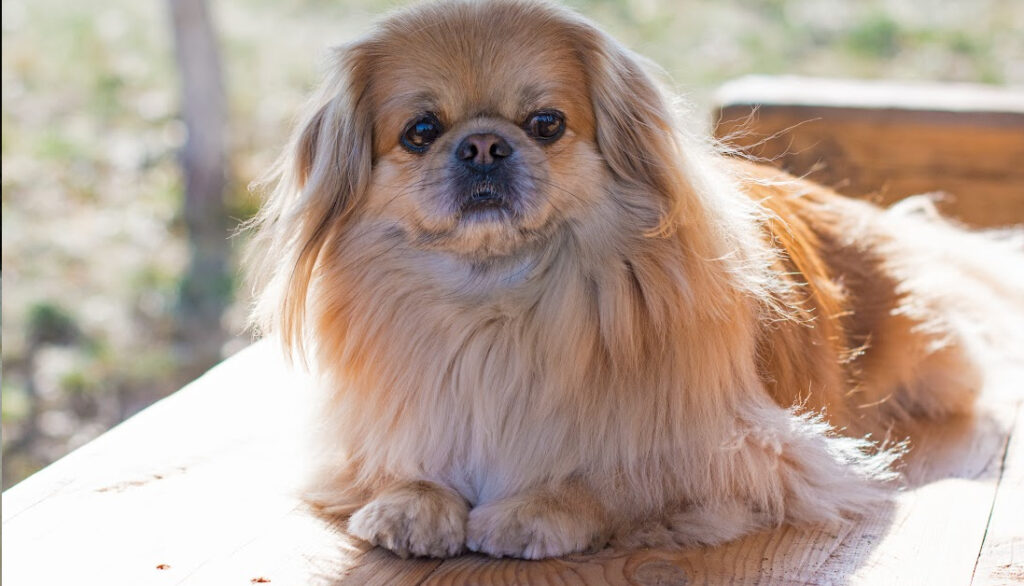
Pekingese: A Pint-Sized and Proud Breed
Characteristics of Pekingese Dogs
Pekingese dogs, affectionately known as ‘Peke’, are a breed that’s both pint-sized and proud. Originating from China, these small dogs were once the companions of Chinese emperors and are thus known for their regal and dignified demeanor.
Pekingese dogs are characterized by their distinctive flat faces, large, round eyes, and lion-like mane, which earns them the nickname, “Lion Dogs”. They have a thick double coat that is often gold, red or sable in color, though they can come in almost any color. Their size ranges from small to medium, with males standing 6-9 inches tall and females a bit smaller.
Despite their small size, Pekingese dogs are not a frail breed. They are sturdy, robust, and have a slightly longer than tall build that gives them a somewhat rolling gait. Their personality is equally robust – they are self-assured, independent, and have a tendency to be a bit stubborn. However, they are also affectionate and loyal to their owners, making them excellent companions.
Caring for a Pekingese
Owning a Pekingese is a responsibility that comes with specific care requirements. Due to their thick double coat, Pekingese dogs need regular grooming to prevent matting and skin problems. Brushing them several times a week will help keep their coat healthy and shiny.
Exercise is also crucial for the Pekingese, but they are not as active as some other breeds. A few short walks a day and some playtime indoors is usually enough to keep them happy and healthy. Despite their proud demeanor, Pekingese dogs are quite adaptable and can thrive in both apartments and houses, as long as they have the companionship and love of their owners.
Pekingese dogs have a brachycephalic (short-nosed) facial structure, which can make them susceptible to certain health issues like breathing problems and heatstroke. It’s important to avoid strenuous exercise and keep them in cool environments.
Feeding your Pekingese a balanced diet that’s appropriate for their age, size, and health is also crucial. Overfeeding can lead to obesity, which can exacerbate health problems, particularly those related to their unique facial structure.
Training a Pekingese can be a challenge due to their independent and stubborn nature. However, with patience, consistency, and positive reinforcement, they can be well-behaved pets. Begin training and socialization early to help them develop into well-rounded dogs.
In summary, Pekingese dogs are a pint-sized and proud breed filled with personality. They are loyal, loving companions who deserve owners willing to meet their unique care needs. If you’re considering adding a ‘Peke’ to your family, you’ll surely enjoy their regal presence and devoted companionship.
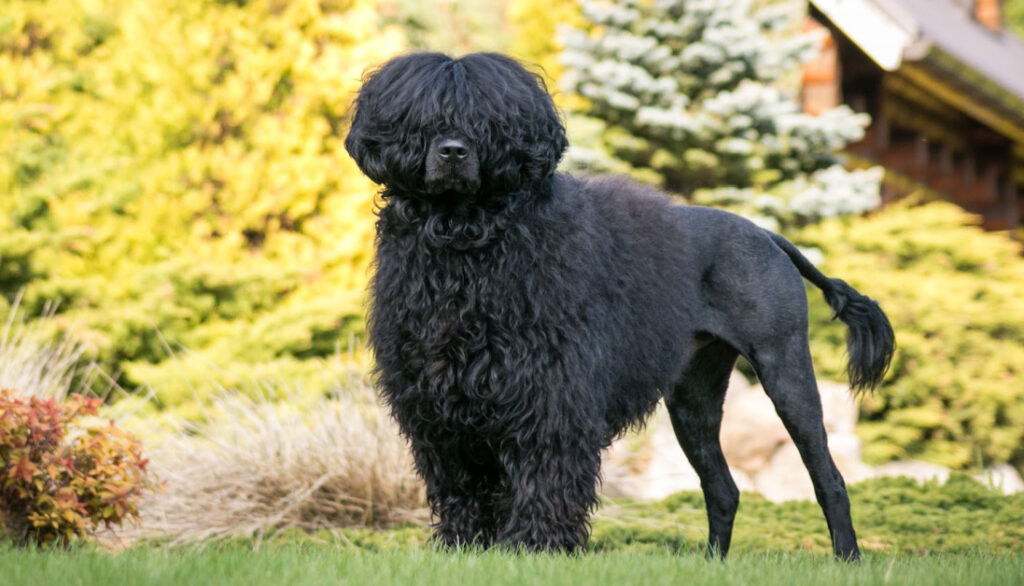
Portuguese Water Dog: A Playful and Protective Breed
Understanding Portuguese Water Dogs
For those in search of dog breeds that start with P, the Portuguese Water Dog makes an excellent choice. This breed, known in its native Portugal as Cão de Água, is a highly intelligent and athletic breed, originally bred to assist fishermen by retrieving lost equipment and herding fish into nets.
Portuguese Water Dogs are medium-sized, typically weighing between 35 to 60 pounds. They are known for their curly or wavy coat, which is virtually hypoallergenic and shed-free. This breed sports a variety of solid colors like black, white, brown, or combinations of black or brown and white.
We can’t talk about Portuguese Water Dogs without mentioning their playful and adventurous nature. These dogs are lively, self-assured, and love being the center of attention. They have a strong desire to please their humans, which makes them an excellent choice for active families. Nevertheless, they’re also protective and could be wary of strangers, making them excellent watchdogs.
Tips for Raising a Portuguese Water Dog
Raising a Portuguese Water Dog requires commitment, but with the right approach, the rewards are immeasurable. Here are a few pointers:
- Socialization: Start socializing your Portuguese Water Dog at an early age. This helps them become more comfortable around other dogs, people, and new environments.
- Training: Due to their intelligence and eagerness to please, Portuguese Water Dogs respond well to training. Positive reinforcement techniques work best with this breed.
- Exercise: As an active breed, these dogs require regular physical and mental stimulation. Daily walks, swimming sessions, and interactive toys can keep them engaged and happy.
- Grooming: Their distinct coat requires regular brushing to prevent matting. They also need occasional trims to keep their fur looking neat.
- Health: Portuguese Water Dogs are generally healthy, but like any breed, they are prone to certain health conditions. Regular vet check-ups and a nutritious diet are a must.
It’s important to remember that every dog is an individual. Although they share common breed characteristics, Portuguese Water Dogs can exhibit unique traits. Patience and understanding are essential when raising any dog breed.
Wrapping Up
Choosing a dog breed that starts with P like the Portuguese Water Dog can indeed add a touch of excitement to your life. With their playful, protective nature and unique appeal, they can easily become an adored member of your family. Remember, raising a dog is not just about selecting a breed that suits your lifestyle, but also about providing a loving, caring environment where your furry friend can thrive. Embrace the journey, and you’ll enjoy the unconditional love and companionship that these wonderful creatures bring.
Frequently Asked Questions
Q1: What are some popular dog breeds that start with P?
A: Some popular dog breeds that start with P include Pomeranians, Poodles, Pugs, and Pitbulls.
Q2: Are there any small-sized dog breeds that start with P?
A: Yes, there are several small-sized dog breeds that start with P, such as Pomeranians, Papillons, and Pekingese.
Q3: What are some characteristics of Poodle dog breed?
A: Poodles are known for their intelligence and ease of training. They come in three sizes: standard, miniature, and toy, and have a hypoallergenic coat which may reduce allergic reactions.
Q4: Are Pitbulls a good family dog?
A: Yes, despite some negative stereotypes, Pitbulls can make excellent family pets. They are known for their loyalty, affection, and ability to get along well with children.
Q5: What are some health issues common in Pugs?
A: Pugs are prone to certain health issues such as brachycephalic syndrome, hip dysplasia, and eye problems. Regular vet check-ups and a healthy diet can help manage these issues.
Dr. Candy, a holistic veterinarian and certified raw dog food nutrition specialist, graduated from Oklahoma State University in 2009 with a DVM and has since specialized in companion animal nutrition, advocating for species-specific diets. With a background in wildlife rehabilitation and oil spill response, she combines holistic health and conventional medicine in her unique approach to treating chronic diseases, allergies, and autoimmune conditions in pets. As the owner of a veterinary practice in Colorado and an author, Dr. Candy is dedicated to educating pet parents and improving the health and happiness of animals.




